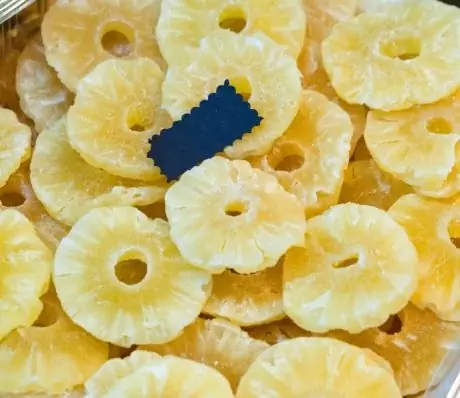- Author Rachel Wainwright wainwright@abchealthonline.com.
- Public 2023-12-15 07:39.
- Last modified 2025-11-02 20:14.
Calorie content of fruits

Fruits are juicy fruits of trees or shrubs that people use in cooking, cosmetology, and medicine. Fruits, the calorie content of which varies depending on the type, are very useful, have a pleasant taste, they are irreplaceable sources of vitamins, various useful substances, have antiallergic, antiviral and immunostimulating properties.
Supporters of healthy eating, despite the fact that the calorie content of many fruits is quite high, argue that even those who are on diets should eat them daily in small quantities.
Many people who want to lose weight often think about how many calories are in fruit. In nature, there are many types of fruits that have a negative calorie content, that is, after eating them, the body spends much more energy than it receives, due to which weight loss occurs. The developers of most diets recommend eating as much fruit as possible when losing weight, however, before starting to build your diet, it is worth figuring out what kind of fruits you can with a diet. The composition, effect on the body and properties of different types of fruits are not the same, but they all contain useful vitamins, fiber and minerals, and also have a beneficial effect on the digestion process.
What fruits can you diet
The calorie content of fruits when following a diet plays a primary role, as well as when considering products that will make up a person's diet. The difference in the number of calories in fruits is striking: for example, one apple contains only 48 kcal, while one banana contains 150 kcal, but one apple is unlikely to get enough, while one banana is a complete snack.
High-calorie fruits such as bananas, persimmons, avocados and grapes contribute to the accumulation of fat, as they are high in fructose. Those who have a desire to lose weight should avoid consuming these high-calorie fruits in the evening, in some diets they are completely forbidden to use. The high calorie content of fruits is due to the fact that they contain a large amount of carbohydrates, tannins, organic acids, essential oils, vitamins and minerals.
In order to lose weight, nutritionists advise to arrange fasting days twice a week, during which it is necessary to consume fruits, the calorie content of which is low. The total number of calories consumed on fasting days should be from 1200 to 1500 kcal, which will allow you to lose up to 5 kg per week. Low-calorie fruits include apples, pears, oranges, apricots and grapefruits, and they can form the basis of the diet.
How many calories are in dried fruits
Dried fruits are delicious and very healthy dried and dehydrated fruits and berries, which retain the maximum amount of minerals. The calorie content of dried fruits in most species ranges from 200 to 300 kcal per 100 g. They contain large quantities of vitamins A, B1, B2, B3, B5, B6, P, they have an increased concentration of minerals and trace elements, which exceeds 4-5 times the concentration in raw fruits.
Fruits and dried fruits, unlike sugary desserts, are valuable foods and not sources of "empty calories." For those who follow a healthy and active lifestyle, when it is necessary to quickly replenish energy, they are irreplaceable sources of minerals and vitamins wasted during training. The daily recommended intake of dried fruit is 100g.
Calories in dried fruits in most species range from 250 to 300 kcal per 100 g, moreover, 65% of them are easily digestible carbohydrates.

Calories in dried fruits, per 100 g:
- Figs - 278 kcal;
- Dried apricots - 272 kcal;
- Prunes - 264 kcal;
- Raisins - 279 kcal.
Despite how many calories are in dried fruits, they can still be consumed by those who follow a diet, since in small amounts they have a beneficial effect on the intestinal microflora, help cleanse it and remove harmful toxins and toxins from the body. The high calorie content of dried fruits does not interfere with the widespread use of these products in dietetics and cooking as an ingredient for making sauces and compotes.
Dried fruit compote, the calorie content of which is 60 kcal per 100 g, if cooked without sugar, is recommended for diets, and in winter it is an excellent source of minerals and vitamins necessary for the body.
Found a mistake in the text? Select it and press Ctrl + Enter.






